Table of Contents
A Walk Down (Bad) Memory Lane: Revisiting FIRE Cases That University of South Carolina Students Got in Trouble for Simply Talking About

In FIRE’s most recent Stand Up For Speech Litigation Project lawsuit, students hosting a free speech event at the University of South Carolina (USC) made posters using examples of campus censorship pulled straight from FIRE’s case archives. They hoped to raise free speech consciousness on campus and found themselves the subject of a disciplinary investigation for doing so.
Since FIRE’s mission is to address campus censorship whenever it appears (even if we’ve addressed it before!), we now revisit the free speech cases USC investigated students for talking about at a free speech event.
Sit back as we take a chronological stroll down (bad) memory lane:
October 2007: Brandeis Finds Professor Guilty of Racial Harassment for Protected Speech

Professor Donald Hindley of Brandeis University criticized use of the word “wetbacks” in his Latin American Politics course. But because he dared utter the word itself while criticizing the term, Brandeis found Hindley guilty of racial harassment and placed a monitor in his classes. Serious due process questions arose over Brandeis’ handling of Hindley’s case, including its failure to provide Hindley (who at the time had nearly 50 years of teaching experience) a formal hearing or information about the accusations against him in writing before a verdict was reached. Despite heavy criticism from FIRE, the American Civil Liberties Union of Massachusetts, the Brandeis faculty, and the media, Brandeis refused to alter its decision and declared the matter closed, firmly establishing itself as one of the worst censors on campus.
February 2010: Georgetown Refuses to Recognize H*yas for Choice
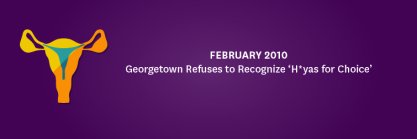
Georgetown University refused to recognize the student group H*yas for Choice, saying the group’s pro-choice stance conflicted with the school’s Jesuit Catholic mission. Georgetown does recognize student groups supporting other religions, which, by their nature, conflict with Catholicism. Georgetown’s Speech & Expression Policy says that “the expression of ideas and sharing of information” is “the very life of the university.” And that wasn’t the group’s last run-in with administrators: In January 2014, Georgetown forced H*yas for Choice members who were tabling in an outdoor area to relocate off campus. But then the group found itself in trouble again just months later, when the university police instructed H*yas for Choice not to table in the very place it had been told to move in January. For their treatment of H*yas for Choice, Georgetown made FIRE’s list of the “10 Worst Offenders” of campus free speech in 2014.
September 2013: Modesto Junior College Says Students Can’t Distribute Constitutions on Constitution Day
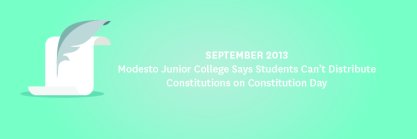
On September 17, 2013, three Modesto Junior College (MJC) students were told by a campus police officer that they could not distribute copies of the Constitution (on Constitution Day, no less) without getting prior administrative permission.
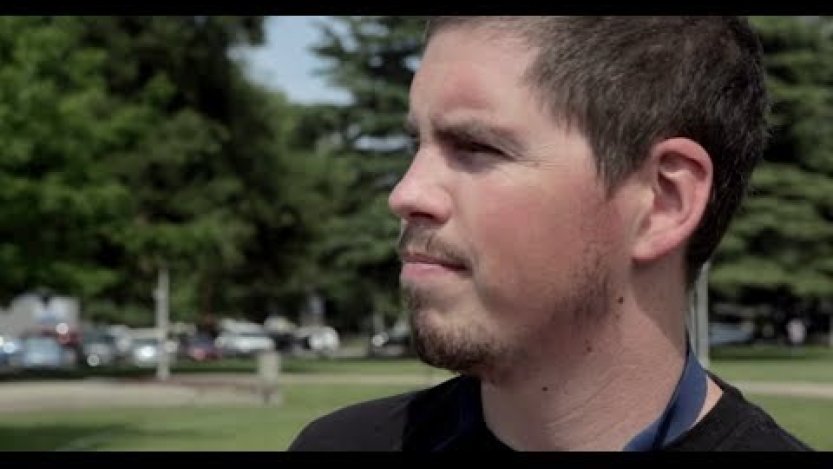
One of the students, Robert Van Tuinen, was told he would have to register his event and might have to wait days or weeks before he could hold it. FIRE wrote to MJC, pointing out that its actions were blatantly unconstitutional and calling on the school to immediately reform its policies. When MJC did not do so, FIRE worked with Van Tuinen and the law firm of Davis Wright Tremaine to coordinate the Stand Up For Speech Litigation Project’s first lawsuit. MJC settled the lawsuit in February 2014, agreeing to revise its unconstitutional speech codes and pay $50,000 in damages and fees.
November 2013: Chicago State University Censors Faculty Voice Blog

Chicago State University threatened legal action unless the CSU Faculty Voice—a blog authored by CSU faculty members that is often highly critical of the CSU administration’s perceived corruption and incompetence—was shut down. After one of the founders of the blog, Professor Phillip Beverly, refused, CSU hired lawyers to pursue unfounded claims of trademark infringement against the blog. In a letter to CSU, FIRE refuted these claims. However, CSU doubled down, scurrying to adopt a broad “cyberbullying policy,” which it promptly used to attempt to silence Professor Robert Bionaz, another frequent contributor to the Faculty Voice.
In July 2014, the two professors sued CSU as part of a FIRE-sponsored Stand Up For Speech Litigation Project lawsuit. That case is still being litigated.
August 2014: University of Illinois at Urbana-Champaign Rescinds Steven Salaita’s Job Offer over Social Media Posts

The University of Illinois at Urbana-Champaign (UIUC) sparked an intense, nationwide debate over civility and professors’ right to free speech when it rescinded its job offer to Steven Salaita over controversial anti-Israel statements made on Salaita’s personal Twitter account. Ignoring its First Amendment obligations, UIUC announced that it “cannot and will not tolerate … personal and disrespectful words or actions that demean and abuse either viewpoints themselves or those who express them.” Although FIRE and other free speech advocates rallied in Salaita’s defense, UIUC’s Board of Trustees refused to reconsider its decision. Salaita then filed a federal lawsuit against the school’s Board of Trustees, which was settled last fall.
August 2014: “Taco Tuesday” Party Scandal at California State University, Fullerton

The Alpha Delta Pi (ADPi) sorority at California State University, Fullerton (CSUF) was charged with seven conduct violations after it held a “Taco Tuesday”-themed recruitment event, at which many of its members wore Mexican clothing items and costumes. CSUF found ADPi guilty of numerous conduct infractions, including disrupting university operations, “[d]isorderly, lewd, [indecent], or obscene behavior,” and “[c]onduct that threaten[s] or endangers the health or safety” of CSUF community members. ADPi was required to coordinate a mandatory workshop on “cultural competencies” and diversity as punishment and develop a “we are a culture not a costume” campaign. FIRE wrote to CSUF denouncing the conduct charges and sanctions against ADPi as meritless and unconstitutional and demanded their complete and immediate dismissal. CSUF’s actions, and its refusal to remove the disciplinary finding or sanctions, earned it a spot on FIRE’s list of “The 10 Worst [Free Speech] Offenders of 2014.”
January 2015: Marquette Tries to Revoke Professor’s Tenure for Private Blog

Marquette University remains engaged in a chilling campaign to revoke the tenure of political science professor John McAdams due to writings on his private blog. McAdams criticized a graduate instructor for what he viewed as her inappropriate suppression of certain viewpoints for in-class discussion (one student’s opposition to same-sex marriage in particular), and the instructor came in for heavy criticism. Marquette then suspended McAdams without due process and abruptly canceled his classes for the next semester. It also publicly insinuated that McAdams violated its harassment policy and was a safety threat to the campus, despite a complete lack of proof for either charge. Marquette’s disregard of due process and its incredible denial that its campaign against McAdams’ tenure implicates free speech or academic freedom in any way should frighten anyone concerned about faculty rights. McAdams’ fate remains uncertain and the professor’s appeal is ongoing, more than a year after Marquette announced it was seeking his termination.
March 2015: George Washington University Student Suspended for Souvenir Indian Swastika

The George Washington University (GWU) suspended a student, temporarily evicted him from university housing, and banned him from campus in response to his posting of a small souvenir swastika purchased in India on his residence hall’s bulletin board. The student, who is Jewish, had wanted to teach other residents about the cultural heritage of the swastika as a symbol of good luck, and he stayed by the residence hall’s bulletin board, which had recently been vandalized with drawn swastikas, to answer questions. The incident was reported to GWU police, and shortly thereafter the school charged the student with five conduct violations and reported his case to the District of Columbia police as a potential hate crime. Citing GWU’s promises of free expression, FIRE called on GWU to drop the charges.
November 2015: University of Missouri Polices “Hurtful” Speech
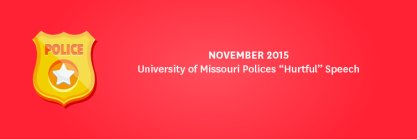
The University of Missouri Police Department issued a campus-wide email threatening punishment for students engaged in “hateful and/or hurtful speech” and encouraging students to file police reports if they witness such speech. The email also instructed students to provide police with “detailed description[s]” and photographs of any incidents. FIRE sent Mizzou a letter reminding the university that the majority of speech considered subjectively “hateful” or “hurtful” is protected by the First Amendment, and further asked Mizzou to clarify that it would not discipline students on these unconstitutionally broad and vague grounds. FIRE is still monitoring the situation for a favorable resolution.
Recent Articles
FIRE’s award-winning Newsdesk covers the free speech news you need to stay informed.
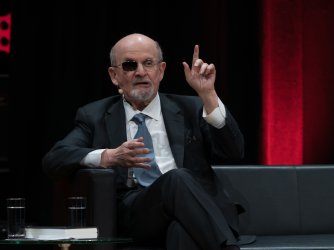
Salman Rushdie calls out left-wing censorship in CBS interview

Western Washington University punishes racing team for sending a photo of a penis drawing on a pizza box
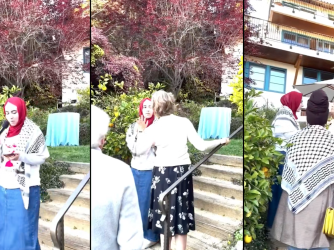
No, the Berkeley Law student didn’t have a First Amendment right to interrupt the dean’s backyard party
